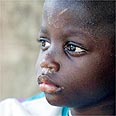
Israeli angel of children with AIDS
Until Professor Daniel Engelhard arrived, a child died every week in the orphanage in Addis Ababa. Since his arrival the deaths have almost stopped, the medical care has improved, and the smiles have returned to the children’s faces. ‘These are the moments when it’s worth it to be a doctor,’ he says
About a year ago, when Professor Daniel Engelhard entered the Mother Teresa Orphanage in Addis Ababa for the first time, he saw a wall drawing of Jesus hugging dead children. So moved was he by the great despair evident in the picture, along with the acceptance of cruel fate, that he decided to take action and to turn the orphanage, which houses 400 HIV-positive children, into his project.
Since then Engelhard, Head of the Department of Pediatric Infectious Diseases and AIDS at Hadassah University Hospital, has been to the orphanage many times, and today he works with a staff of dozens of volunteers—students and medical residents at Hadassah—who go all the way to Ethiopia to give the sick children the most devoted care.
“When we first came to the orphanage one child a week was dying,” said Engelhart in a phone call from Addis Ababa. “In the last four months, since we started working here intensively, only one girl has died. This is an enormous achievement for us.”
“You see the children’s joie de vivre, their smiles, their eyes that speak, and then you are simply happy,” he noted enthusiastically. “In January I brought two medical clowns here. For a week they spoke to the children in gibberish and made them laugh. They worked miracles. If there are moments when it’s worth it to be a doctor, then these are those moments. To come from such a faraway place and to bring a small smile to the face of a child who has nobody in the world—it’s worth everything.”
'It’s a story of perseverance'
Engelhard would like to see more volunteers coming to the orphanage, but this is not always possible.
“We have no money. I have dozens of medical students, doctors, and nurses who want to come to help the children, but there is no budget. This is the largest obstacle I’m facing right now.”
The project would not have been started without Dr. Amit Dotan, the first to come to the orphanage. He recently returned to Israel with his fiancee, Dr. Idit Wachsberg, after spending four months there. In three months they are getting married, and they have already adopted two children from the orphanage.
“We adopted two, but all 400 of the children are mine,” says Dotan. “The time I spent with them made me fall intensely in love with them.”
“When you see these children,” adds Wachsberg, “dressed well and receiving love, suddenly it seems that their illness has disappeared because they are smiling. The orphanage is not a depressing place. It’s a place where you see the children’s joie de vivre.”
Addis Ababa is not the first difficult place that Dr. Engelhard has seen. Engelhart, who received a medal for his service in the Yom Kippur War, has seen incidents in Cambodia, Rwanda, Turkey, and Kosovo involving large numbers of casualties.
“I was in all these countries for a defined period of time. The story in Addis Ababa is something different. Here it’s a story of perseverance,” he said.
Engelhard notes that the Israeli staff will soon be operating another orphanage six hours from Addis Ababa.
“I was there and I saw the children hurting and sad, and I intend to make them smile,” he said.










